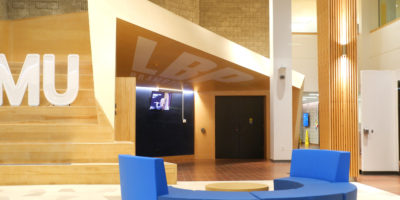I’m running out the door at warp speed, with wet hair, no breakfast and 14 minutes to catch a train that’s 20 minutes away – not the most relaxing way to start a Friday. I make a mad dash through the Go Train parking lot and dive between the sliding doors that a stranger has kindily held open for me. I slump into my seat, take a breath and swear to never trust the snooze button again. It’s then I realize I’ve forgotten my notebook, cell phone and mind at home.’Thank God it’s Friday?’ Whoever coined that phrase was never a Ryerson commuter.
It’s exhausting experiences like this that are making commuters head to their own house after class rather than Oakham. Which leads to the question: Are commuters missing out on an essential part of university?
It’s not written in RyeSAC’s student handbook, but the best part of a university education is supposed to take place outside the classroom. It’s the frosh events, the pub nights, and all the stuff that happens after Kerr Hall empties that makes paying tuition a little easier. But long commutes are costing some students the chance to take a walk on Ryerson’s Van Wilder side.
“I’ve had no involvement in any extra-curricular activity whatsoever,” says Fiyyaz Jaat, a fourth-year computer science student. Jaat drives 45 minutes to school from Kleinburg, located just outside of Woodbridge. “Parking is expensive, so I just go to class and then bounce (or leave, for our not so hip readership).”
Jaat originally decided to commute because he didn’t like the thought of leaving home after high school.
Now, months away from graduation, he says he would live closer to campus if he could turn back his post-secondary clock. “I thought school would be more than just studying, but whatever.”
While Jaat has had four years to deal with his disappointment, Ryerson’s double cohort class is just beginning to learn the woe of scheduling their lives around public transit schedules.
“I feel isolated from the rest of the school because it’s harder to go to extra-curricular activities,” says first-year student Jennifer Fong.
In her first month at Ryerson, Fong has yet to attend a Ryerson pub night. She intended to split a few pints with her classmates, but like numerous other first-year commuters, her only experience of ‘chugging’ at Ryerson has been listening to the sound of the Go Train.
“[I’m] definitely isolated from the people living on campus,” says Blake Perry, a first- year journalism student who commutes from Mississauga.
Perry’s trip is 70 minutes each way – including rides on both the GO Train and subway.
He says the main reason he doesn’t participate in anything extra-curricular is because his last train leaves before most events start.
RyeSAC President Ken Marciniec says the reason RyeSAC events begin at night is so they do not interfere with classes.
But the late starts are not fitting into most commuters’ timetables.
“My bus doesn’t run very late,” says Akane Ishikarma, a second-year fashion design student. Ishikarma says commuting from Missisauga has not only caused her to miss RyeSAC functions, but also events related to her program.
“During fashion week, [fashion students] volunteer to help, but you have to be able to stay until like two in the morning,” says Ishikarma.
“My last bus leaves at midnight and even then it doesn’t make all the stops at that time of night.”
Marciniec can understand why commuters feel like they are not taking advantage of the ” total university experience.” “I think some do feel they are missing out,” says Marciniec. “My guess is, given the choice; [commuters] would choose living closer to campus.”
Marciniec cites Ryerson’s Healthy Living Week – coming to Ryerson in second semester – as one event commuters can take part in during regular class time hours this year.
While being reminded to eat your fruits and vegetables sounds like a blast, most commuters may find learning about a balanced diet isn’t making the most of Ryerson’s downtown Toronto campus.
Many commuters want to enjoy the Toronto nightlife with their fellow students, but Ryerson in the wee hours can be a scary location, particularly for young females travelling alone after dark.
Several students interviewed for this story mentioned the reason they didn’t stay for Ryerson pub nights was because they are nervous about walking to the subway at night. However, Ryerson security offers a Watch and Walk program, which accompanies students to the Dundas subway station and other locations within walking distance from campus.
With all these disadvantages, it may appear all commuters are not enjoying their university experience. But it is the disadvantages that are creating a sense of commuter camaraderie.
I can remember kneeling beside a fellow student next to a Go Train bathroom while he was sticking his hand into a garbage slot; he accidentally dropped his ten ride ticket.
Five other students came over and took a turn putting their hands down the garbage. They didn’t know his name, but they felt his painof losing a $30 ticket.
Marciniec says Ryerson commuters have never approached him about organizing an official campus group, but the idea of a commuter-based social group is not new at Toronto’s other universities. The University of Toronto has a Commuter Involvement Association, while York University commuters have their own commuter lounge.
It appears Ryerson has a way to go before us commuters have an official group to call our own.
Until then I propose a toast to all of my fellow commuters for a trek well travelled. Actually, I’ll have to take a rain check on that one, I’ve got a train to catch. – With files from Joel Wass











Leave a Reply